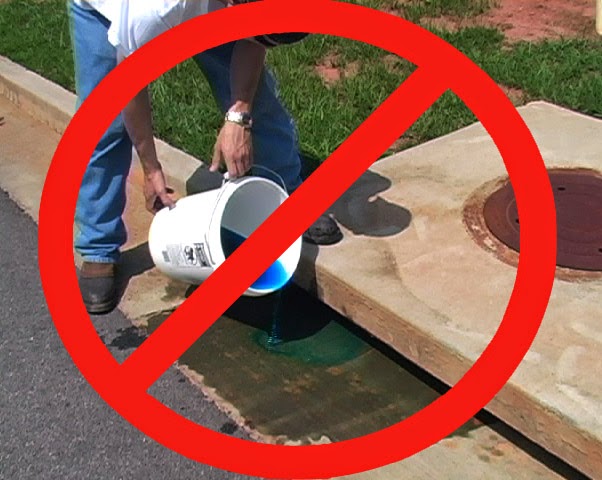 |
| You wouldn't pour this into a lake or creek, right? Storm drains are a direct connection from our streets to our local waters. |
Do you know that only storm water is legally allowed to go into the storm drain? Non-storm water discharge, also known as illicit discharge, causes water pollution by sending pollutants right into creeks, streams, ponds, and lakes. Do you know how to identify these activities so that you can prevent water pollution and help keep our water bodies clean?
 |
| Your street is directly connected to a lake or stream. Stormwater (and anything else dumped in the stormdrain) is piped into nearby water untreated. Keep it clean! |

You may not always catch an illicit discharge as it is happening. Other things to look for include makeshift pipes or hoses that lead to a storm drain or water body, unusual odors accompanying any discharge, water flowing during dry times of the year, dead or distressed fish, plants, or other wildlife.
You can reduce pollution entering the storm sewer by:
- never dumping anything into a storm drain
- taking your used oil to your local waste oil recycling site
- disposing household hazardous wastes properly
- bringing yard waste to your local compost site
- discarding pet waste in a garbage can
- washing your car on your lawn to allow excess water, chemicals, and dirt to be filtered through the grass
- and dechlorinating pool water before draining
Additional information on disposal sites can be found at the Ramsey County Public Health website. http://www.co.ramsey.mn.us/PH/
Certain types of water discharges are not considered illicit. These include water line flushing, air conditioning condensation, irrigation water, water from crawl space pumps, lawn watering, individual residential car washing, dechlorinated swimming pool discharges, and street wash water, discharges or flow from firefighting and other discharges that are necessary to protect public health and safety.
If you see anything that could be considered an illicit discharge, call RWMWD at 651-792-7950. If it is a potentially hazardous spill, call the State Duty Officer at 651-649-5451.
 |
| Whether there is a stencil there or not, the same is true. If you would like to help stencil to remind others, go to www.fmr.org. |

Prevent water pollution, keep our waters clean! Ensure only storm water enters storm drains. Report illicit discharges for a cleaner environment.
ReplyDelete